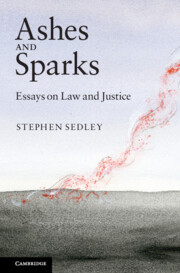Book contents
- Frontmatter
- Contents
- Preface
- Acknowledgements
- PART I History
- PART II Law
- PART III Justice
- 24 The right to know
- 25 The moral economy of judicial review
- 26 Policy and law
- 27 Responsibility and the law
- 28 The Crown in its own courts
- 29 Human rights – who needs them?
- 30 Fundamental values – but which?
- 31 Overcoming pragmatism
- 32 Sex, libels and video-surveillance
- 33 This beats me
- 34 Public inquiries: a cure or a disease?
- 35 Human rights: a twenty-first century agenda
- 36 Are human rights universal, and does it matter?
- 37 Bringing rights home: time to start a family?
- 38 The four wise monkeys visit the marketplace of ideas
- Index
24 - The right to know
Published online by Cambridge University Press: 05 June 2012
- Frontmatter
- Contents
- Preface
- Acknowledgements
- PART I History
- PART II Law
- PART III Justice
- 24 The right to know
- 25 The moral economy of judicial review
- 26 Policy and law
- 27 Responsibility and the law
- 28 The Crown in its own courts
- 29 Human rights – who needs them?
- 30 Fundamental values – but which?
- 31 Overcoming pragmatism
- 32 Sex, libels and video-surveillance
- 33 This beats me
- 34 Public inquiries: a cure or a disease?
- 35 Human rights: a twenty-first century agenda
- 36 Are human rights universal, and does it matter?
- 37 Bringing rights home: time to start a family?
- 38 The four wise monkeys visit the marketplace of ideas
- Index
Summary
This essay was a contribution to a 1999 Festschrift for Sir David Williams QC, Cambridge's first full-time Vice-Chancellor and a distinguished public lawyer who had written far more elegantly than I could on subjects like this.
There was an expectation in 1999 that the coming into domestic effect of the European Convention on Human Rights would give us two much-needed rights: privacy and access to information. The first has been slow in coming, but under pressure from Strasbourg it is largely now there. The second has come through Parliament's own initiative, the Freedom of Information Act 2000. It is not exactly a cornucopia, but in the hands of a vigilant Information Commissioner it has worked well, sometimes – and rightly so – to the embarrassment of the government which promoted it.
‘Oh God, they have deceived me’: George III on his deathbed.
We are accustomed to finding that we have been lied to. To insure ourselves against such deceptions we repeat the mantra that we don't believe everything we read in the newspapers. There have been, and must still be, parts of the world where the reputation of the press is such that people don't believe anything they read in their newspapers. Because our experience in the United Kingdom is less uniformly bad, we tend to give initial credence to what we are told.
- Type
- Chapter
- Information
- Ashes and SparksEssays On Law and Justice, pp. 233 - 245Publisher: Cambridge University PressPrint publication year: 2011



